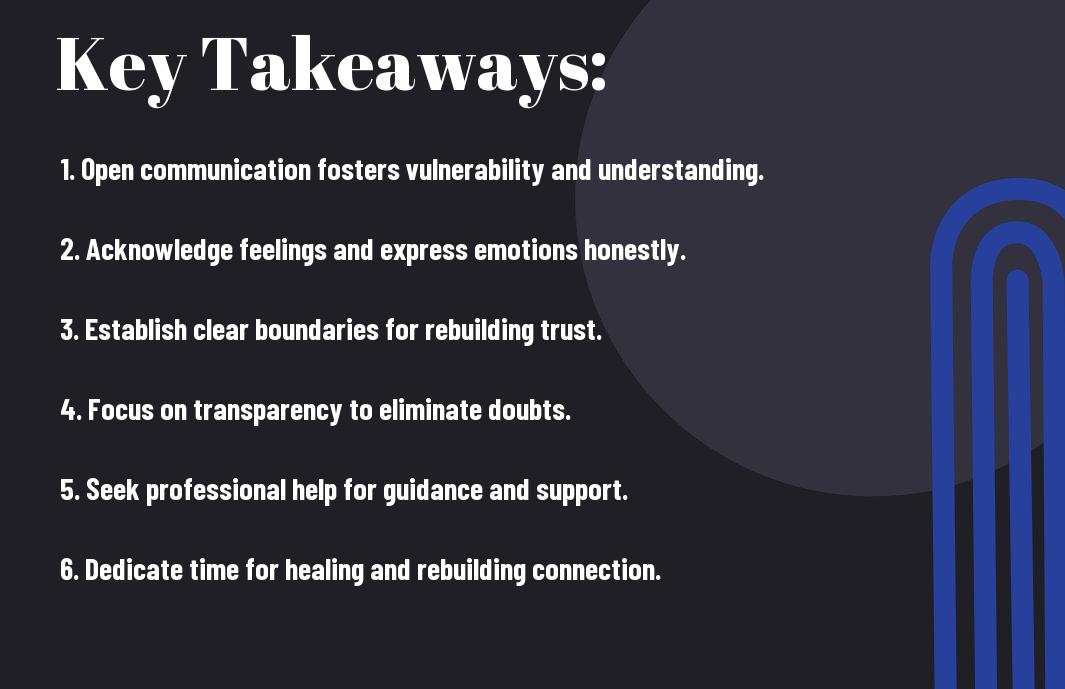Just as a house requires a strong foundation, your marriage demands trust to thrive. When infidelity disrupts this bond, trust issues can arise, making it challenging to reconnect. However, it’s vital to address these issues head-on for the sake of your relationship. In this post, you’ll learn practical strategies to repair the damage and rebuild trust, fostering a healthier and stronger partnership. Navigating this journey may be tough, but with commitment and communication, you can turn a painful chapter into a story of resilience and growth.

Key Takeaways:
- Open communication is vital for rebuilding trust; discussing feelings and concerns honestly can create a pathway to healing.
- Both partners should acknowledge their roles in the cheating event, as understanding underlying issues can prevent future problems.
- Establishing boundaries and expectations post-infidelity is important for fostering a sense of safety and security in the relationship.
- Consider seeking professional help, such as couples therapy, to facilitate the healing process and guide conversations about trust.
- Forgiveness is a process that takes time; both partners must be patient and willing to navigate their emotions together.
- Engaging in positive experiences and shared activities can help restore intimacy and strengthen the bond between partners.
- Rebuilding trust requires consistent actions over time; both partners must demonstrate reliability and commitment to the relationship.


Understanding Trust Issues
Your marriage depends on a foundation of trust, enabling open communication and emotional intimacy. When trust is broken, especially through cheating, it can lead to feelings of betrayal, insecurity, and fear. Understanding the root of these trust issues is necessary for rebuilding your relationship. Recognizing the underlying factors contributing to trust concerns can empower you and your partner to navigate this challenging period with clarity and a commitment to healing.
The Impact of Cheating
Beside the emotional fallout, cheating often disrupts the fundamental connection in a marriage, making partners question their self-worth and commitment. The betrayal not only causes hurt but can lead to long-lasting distress, impacting day-to-day interactions. It’s necessary to address these effects openly to facilitate recovery and restore emotional safety.
Recognizing Trust Issues in Marriage
Issues often arise when one partner feels insecure or doubtful about the other’s loyalty. Signs can manifest as constant doubts, jealousy, or a withdrawal from emotional intimacy. Due to the emotional scars resulting from infidelity, it’s vital to foster a dialogue where both partners feel safe to express their feelings. Addressing these signs directly can help you both understand each other’s perspectives and pave the way for rebuilding trust. Additionally, acknowledging these issues shows a commitment to the relationship, which can be the first step toward healing.
Rebuilding Trust After Infidelity
If you’ve experienced infidelity in your marriage, rebuilding trust can be a challenging journey, but it’s imperative for moving forward. It requires time, patience, and a commitment from both partners to heal the wounds caused by betrayal. You must actively work together to restore the connection and understanding that is vital in a healthy relationship.
Open Communication
About establishing a safe space for both partners to share feelings and fears, open communication is necessary for rebuilding trust. You should both express your emotions honestly and discuss the circumstances surrounding the infidelity, as well as your expectations for the future. This fosters a deeper understanding and can significantly aid in the healing process.
Establishing Transparency
Communication is not just about sharing feelings but also ensuring that you keep each other informed about your daily lives. Establishing transparency means being open about your whereabouts, friendships, and online interactions. This openness can help alleviate anxiety and discomfort created by the betrayal, allowing for a slower, guiding return to intimacy.
Hence, when you engage in transparent communication, it builds a foundation of trust in your relationship. You can share details about your schedules, and allow your partner to access your social media accounts if necessary. By doing so, you demonstrate a commitment to honesty and an understanding of the importance of accountability. This proactive approach will help alleviate your partner’s worries and encourage a stronger bond over time. Always remember, rebuilding trust takes consistent effort from both of you, but with commitment, it is certainly achievable.
Seeking Professional Help
Despite the challenges you may face after infidelity, seeking professional help can be a vital step towards rebuilding trust in your marriage. A professional therapist can offer insights and tools tailored to your unique situation, providing a safe space for both partners to express their feelings. Engaging in therapy can promote healing and facilitate open communication, ultimately leading to a stronger bond.
Couples Therapy
Help your relationship heal by engaging in couples therapy, where both partners come together to work through issues. A therapist can guide you through sensitive topics and help you develop healthy communication strategies that foster understanding and empathy between you and your partner.
Individual Counseling
For those struggling to cope with the emotional aftermath of cheating, individual counseling offers a supportive environment to process your emotions and gain perspective. This one-on-one setting allows you to explore your feelings deeply and address any underlying issues that may have contributed to the infidelity.
Seeking individual counseling can provide you with tools to manage your feelings and understand the factors that led to the situation. A counselor can help you develop coping mechanisms for dealing with anger, guilt, or sadness, allowing you to work through your emotions constructively. In doing so, you lay a foundation for personal growth, which is necessary for rebuilding trust within the marriage. Taking this step not only improves your well-being but can also benefit your relationship as a whole.
The Role of Forgiveness
Once again, forgiveness is a fundamental component in rebuilding trust after infidelity. It allows both partners to heal, letting go of the pain and resentment associated with the betrayal. By embracing forgiveness, you create a pathway toward renewal, enabling you to both move beyond the hurt and reclaim the intimacy that may have been lost. This process requires patience and commitment from both partners, but it paves the way for a healthier relationship, ultimately transforming the experience into a profound learning opportunity.
Understanding the Forgiveness Process
Above all, it’s crucial to recognize that forgiveness is not an instant resolution; it’s a gradual journey. You need to allow yourself to feel hurt and acknowledge your emotions, while also making a conscious effort to release the negative feelings attached to the betrayal. This journey involves open communication and vulnerability, with both partners engaging in honest discussions about the pain, expectations, and aspirations that exist post-infidelity.
Moving Forward Together
Forgiveness opens doors for you and your partner to move forward together, fostering a deeper connection and understanding. Without forgiveness, the shadows of distrust may linger, hindering growth. By committing to this process, you demonstrate that you value your relationship and are willing to put in the effort. The key is to actively support each other’s healing, allowing space for both partners to express their fears and hopes, leading to a renewed bond filled with respect and compassion.
This journey toward healing after infidelity challenges you to transform pain into growth. Make it a point to engage in regular discussions about your feelings, which can help in reinforcing your newfound trust. Establishing healthy boundaries and engaging in shared activities can foster closeness and rebuild intimacy as you both navigate this sensitive landscape. Note, the goal is to come out stronger, using the lessons learned to create a more resilient foundation for the future. This isn’t just about moving past betrayal; it’s about emerging from it with a deeper appreciation for your relationship and a renewed commitment to each other.
Setting Boundaries
Not establishing clear boundaries after a breach of trust can lead to ongoing misunderstandings and resentment. To rebuild your marriage, it’s imperative to outline what is acceptable and what is not moving forward. This includes defining time for personal space, communication practices, and social interactions. Open dialogue about your needs and fears will promote transparency and help you both feel secure in the relationship.
Creating Safe Spaces
Beside setting limits, creating safe spaces where you can communicate openly is vital. This involves dedicating time to talk without distractions, ensuring both you and your partner feel heard and understood. Safe spaces allow for the expression of feelings without the fear of judgment, fostering an environment conducive to healing.
Defining Relationship Expectations
Below establishing boundaries, it’s necessary to define your relationship expectations clearly. This includes discussing fidelity, emotional support, and daily interactions that affirm your commitment to one another.
In addition, having an explicit conversation about relationship expectations will help you both set clear parameters on how to navigate your partnership. Identify what you both want from the relationship, whether it’s honesty, transparency, or a deeper emotional connection. Discuss how each of you can fulfill these expectations to bolster trust and stability. Regularly revisiting these expectations ensures that both you and your partner remain aligned and accountable, fostering integrity in your relationship.
Strengthening the Marital Bond
To rebuild a strong connection post-infidelity, actively engage in open conversations, fostering vulnerability and trust. Utilize resources like How to Build Trust with Your Partner After Infidelity to guide your journey. By focusing on communication, emotional support, and shared experiences, you can reinforce the foundation of your marriage and deepen your bond.
Reviving Intimacy
Among the many aspects affected by an affair, intimacy is often one of the most fragile. To restore closeness, engage in affectionate gestures, prioritize quality time together, and share your feelings openly. Reawakening this important element takes patience and understanding, so approach it gradually while being attentive to each other’s needs.
Shared Goals and Activities
To enhance your relationship, focus on establishing shared goals and engaging in activities that you both enjoy. This can create a sense of teamwork and unity. When you work together toward a common purpose, it fosters connection and rekindles your commitment to each other.
Considering your shared interests can significantly impact your relationship’s dynamics. When you set shared goals, like planning a vacation, adopting a pet, or pursuing a collective hobby, you not only align your visions for the future but also create lasting memories that reinforce your bond. Engaging in joint activities promotes cooperation, encourages deeper conversations, and helps you rediscover what you love about each other, ultimately steering your marriage toward a healthier and more fulfilling direction.
To wrap up
Drawing together the insights shared, addressing trust issues in your marriage after cheating requires open communication and a commitment to rebuilding trust. You should take the time to express your emotions, actively listen to your partner, and engage in honest dialogues about expectations and boundaries. Consistent actions and transparency will be imperative as you both work toward healing. Be patient with yourself and each other, as restoring trust is a process that takes effort and time. By focusing on forgiveness and understanding, you can pave the way for a stronger, more resilient relationship.
FAQ
Q: What are trust issues in a marriage after cheating?
A: Trust issues in a marriage after cheating typically arise when one partner has been unfaithful, leading to feelings of betrayal, doubt, and insecurity in the relationship. The emotional fallout from this breach of trust can cause one or both partners to struggle with believing in the other’s commitment and honesty, often requiring significant work to rebuild that trust over time.
Q: Can trust be rebuilt after infidelity?
A: Yes, trust can be rebuilt after infidelity, but it takes effort from both partners. This process usually involves open communication, accountability from the unfaithful partner, and a willingness from both partners to work through their feelings and establish healthier patterns. Couples therapy can be very helpful in guiding this process, as it provides a safe space to address underlying issues and improve emotional connections.
Q: What steps can couples take to address trust issues after cheating?
A: Couples can take several steps to address trust issues after cheating, including:
1. Engaging in honest dialogues about feelings, fears, and expectations.
2. Establishing clear boundaries and commitments moving forward to foster a sense of security.
3. Seeking professional counseling to navigate complex emotions and gain insights into the dynamics of their relationship.
4. Allowing time for healing, as trust takes time to re-establish.
5. Practicing transparency and openness in everyday interactions to rebuild faith in each other.
Q: How can the unfaithful partner show they are committed to rebuilding trust?
A: The unfaithful partner can show their commitment to rebuilding trust by taking responsibility for their actions, being open and honest about their feelings, providing reassurance, and actively listening to the concerns of their spouse. Consistent, transparent behavior and a willingness to participate in counseling or support groups can also demonstrate a genuine desire to make amends and strengthen the relationship.
Q: What should the loyal partner do to cope with trust issues?
A: The loyal partner should focus on self-care and emotional well-being while navigating trust issues. This could involve establishing personal boundaries, seeking support from friends or a therapist, and understanding their feelings fully. It may be helpful to communicate openly with the unfaithful partner about their struggles and seek reassurance as needed. Engaging in individual or couple’s therapy can provide valuable tools for processing emotions and moving forward.
